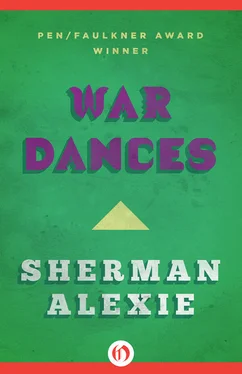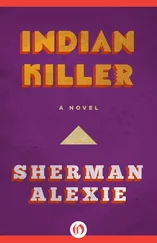And so a surprised and delighted Lois spent the rest of the day thinking of verbs that more accurately reflected our interactions with the dead.
Mr. X is assailed by his family and friends.
Mr. X is superseded by his family and friends.
Mr. X is superimposed by his family and friends.
Mr. X is sensationalized by his family and friends.
Mr. X is shadowboxed by his family and friends.
Lois laughed as she composed her imaginary obituaries. I’d never seen her laugh that much, and I suspected that very few people had seen her react that strongly to anything. She wasn’t remote or strained, she was just private. And so her laughter — her public joy — was frankly erotic. Though I’d always thought of her as a sexy librarian — with her wire-rimmed glasses and curly brown hair and serious panty hose and suits — I’d never really thought of going to bed with her. Not to any serious degree. I was eighteen, so I fantasized about having sex with nearly every woman I saw, but I hadn’t obsessed about Lois. Not really. I’d certainly noticed that her calves were a miracle of muscle — her best feature — but I’d only occasionally thought of kissing my way up and down her legs. But at that moment, as she laughed about death, I had to shift my legs to hide my erection.
“Hey, kid,” she said, “when you die, how do you want your friends and family to remember you?”
“Jeez,” I said. “I don’t want to think about that stuff. I’m eighteen.”
“Oh, so young,” she said. “So young and handsome. You’re going to be very popular with the college girls.”
I almost whimpered. But I froze, knowing that the slightest movement, the softest brush of my pants against my skin, would cause me to orgasm.
Forgive me, I was only a kid.
“Ah, look at you,” Lois said. “You’re blushing.”
And so I grabbed a random file off her desk and ran. I made my escape. But, oh, I was in love with the obituaries editor. And she — well, she taught me how to write an obituary.
And so this is how I wrote hers:
Lois Andrews, age 45, of Spokane, died Friday, August 24, 1985, at Sacred Heart Hospital. There will be no funeral service. She donated her body to Washington State University. An only child, Lois Anne Andrews was born January 16, 1940, at Sacred Heart Hospital, to Martin and Betsy (Harrison) Andrews. She never married. She was the obituaries editor at the Spokesman-Review for twenty-two years. She is survived by her friends and colleagues at the newspaper.
Yes, that was the story of her death. It was not enough. I felt morally compelled to write a few more sentences, as if those extra words would somehow compensate for what had been a brief and solitary life.
I was also bothered that Lois had donated her body to science. Of course, her skin and organs would become training tools for doctors and scientists, and that was absolutely vital, but the whole process still felt disrespectful to me. I thought of her, dead and naked, lying on a gurney while dozens of students stuck their hands inside of her. It seemed — well, pornographic. But I also knew that my distaste was cultural.
Indians respect dead bodies even more than the live ones.
Of course, I never said anything. I was young and frightened and craved respect and its ugly cousin, approval, so I did as I was told. And that’s why, five days after Lois’s death and a few minutes after the editor in chief had told me I would be writing the obituaries until they found “somebody official,” I found myself sitting at her desk.
“What am I supposed to do first?” I asked the chief.
“Well, she must have unfiled files and unwritten obits and unmailed letters.”
“Okay, but where?”
“I don’t know. It was her desk.”
This was in the paper days, and Lois kept five tall filing cabinets stuffed with her job.
“I don’t know what to do,” I said, panicked.
“Jesus, boy,” the editor in chief said. “If you want to be a journalist, you’ll have to work under pressure. Jesus. And this is hardly any pressure at all. All these people are dead. The dead will not pressure you.”
I stared at him. I couldn’t believe what he was saying. He seemed so cruel. He was a cruel duck, that’s what he was.
“Jesus,” he said yet again, and grabbed a folder off the top of the pile. “Start with this one.”
He handed me the file and walked away. I wanted to shout at him that he’d said Jesus three times in less than fifteen seconds. I wasn’t a Christian and didn’t know much about the definition of blasphemy, but it seemed like he’d committed some kind of sin.
But I kept my peace, opened the file, and read the handwritten letter inside. A woman had lost her husband. Heart attack. And she wanted to write the obituary and run his picture. She included her phone number. I figured it was okay to call her. So I did.
“Hello?” she said. Her name was Mona.
“Oh, hi,” I said. “I’m calling from the Spokesman-Review. About your — uh, late husband?”
“Oh. Oh, did you get my letter? I’m so happy you called. I wasn’t sure if anybody down there would pay attention to me.”
“This is sacred,” I said, remembering Lois’s lessons. “We take this very seriously.”
“Oh, well, that’s good — that’s great — and, well, do you think it will be okay for me to write the obituary? I’m a good writer. And I’d love to run my husband’s photo — his name was Dean — I’d love to run his photo with the — with his — with my remembrance of him.”
I had no idea if it was okay for her to write the obituary. And I believed that the newspaper generally ran only the photographs of famous dead people. But then I looked at the desktop and noticed Lois’s neatly written notes trapped beneath the glass. I gave praise for her organizational skills.
“Okay, okay,” I said, scanning the notes. “Yes. Yes, it’s okay if you want to write the obituary yourself.”
I paused and then read aloud the official response to such a request.
“Because we understand, in your time of grieving, that you want your loved one to be honored with the perfect words—”
“Oh, that’s lovely.”
“—but, and we’re truly sorry about this, it will cost you extra,” I said.
“Oh,” she said. “Oh, I didn’t know that. How much extra?”
“Fifty dollars.”
“Wow, that’s a lot of money.”
“Yes,” I said. It was one-fifth of my monthly rent.
“And how about running the photograph?” Mona asked. “How much extra does that cost?”
“It depends on the size of the photo.”
“How much is the smallest size?”
“Fifty dollars, as well.”
“So it will be one hundred dollars to do this for my husband?”
“Yes.”
“I don’t know if I can afford it. I’m a retired schoolteacher on a fixed income.”
“What did you teach?” I asked.
“I taught elementary school — mostly second grade — at Meadow Hills for forty-five years. I taught three generations.” She was proud, even boastful. “I’ll have you know that I taught the grandchildren of three of my original students.”
“Well, listen,” I said, making an immediate and inappropriate decision to fuck the duck in chief. “We have a special rate for — uh, retired public employees. So the rate for your own obituary and your husband’s photograph is — uh, let’s say twenty dollars. Does that sound okay?”
“Twenty dollars? Twenty dollars? I can do twenty dollars. Yes, that’s lovely. Oh, thank you, thank you.”
“You’re welcome, ma’am. So — uh, tell me, when do you want this to run?”
“Well, I told my daughters and sons that it would run tomorrow.”
Читать дальше












